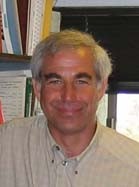
When Mark Machina enrolled in Michigan State University's Ph.D. Microeconomics and Macroeconomics courses, everyone thought he was crazy. "I was only a sophomore, and nobody could believe I was taking these classes until after the midterm, when I did the best in the class," he says. "Since then, I've studied economics, and never turned back."
Machina—who is a Professor of Economics at UC San Diego—went on to receive bachelor's degrees in Economics and Mathematics (with highest honors in both) from Michigan State and earned his Ph.D. in Economics from MIT. Since arriving at UC San Diego in 1979 as an assistant professor, he has focused much of his teaching on microeconomics, mostly for undergraduates, and never gets tired of working here.
"UCSD is a special place," he adds. "I enjoy my colleagues in the Economics Department and other departments, as well as the intellectually-motivated students. I like explaining things and answering thoughtful questions from people who are hungry for knowledge and trying to get a good education. That's why I'm still here."
Although Machina has turned down job offers from institutions such as Duke, the University of Chicago, Stanford and Princeton over the years, he has taken the opportunity to conduct research or teach at other universities both here and abroad. Fellowships have taken him to Australia and New Zealand while he has taught as a visiting professor or lecturer at universities including Columbia, Princeton, Trinity College in Cambridge, England, and the People's University of China, Beijing.
One of his trips to Beijing coincided with the Tiananmen Square protests in 1989 and he actually passed through the square just two hours before the massacre. "When I showed up at my university to teach the next time, I was very nervous," he says, "but my trips to Beijing still left me with wonder and appreciation for a culture very different than our own."
As for his work, Machina has focused most of his efforts on what he calls "robustifying" the classical scientific theories of risk preference and beliefs. He explains: "Economists have developed beautiful theories of how people take or avoid risks—at race tracks, with lotteries or insurance, for example—and form likelihood beliefs. However, a lot of experimental data has emerged, especially from psychologists, that contradicts these theories. 'Robustification' means trying to adopt these theories in a way that preserves their tremendous analytical powers, but makes them consistent with the experimental and empirical data."
Machina has been recognized with many honors for his work, including several teaching awards and election as a Fellow to the Econometric Society and the American Academy of Arts and Sciences. In addition to his teaching and research, he has also been involved with various panels and boards over the years. Currently, he serves as an editor or on the editorial board for no less than eight publications. When asked how he finds the time to do everything, he promptly responds: "I don't!"
But he wouldn't have it any other way.
|